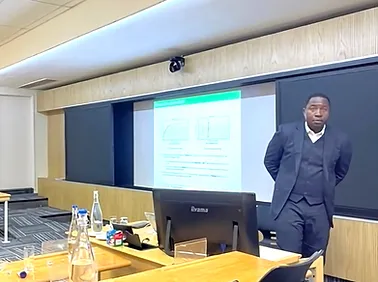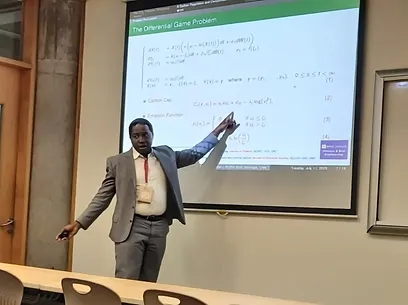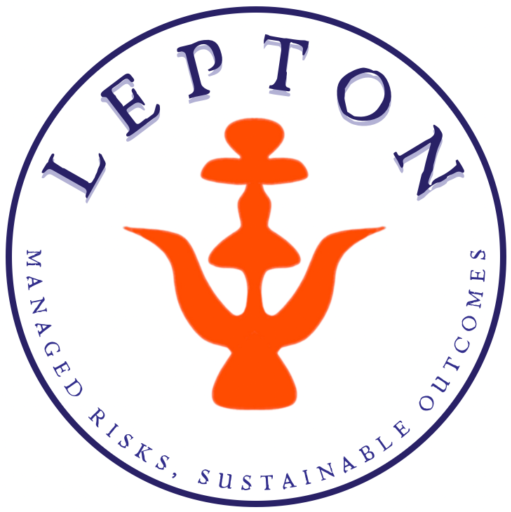
At Lepton Actuarial & Consulting, we are dedicated to driving positive change and sustainable growth through our innovative solutions and unwavering commitment to Environmental, Social, and Governance (ESG) principles.
Harnessing the power of data-driven insights and cutting-edge technologies, we address pressing challenges facing businesses today, from optimizing costs and reducing carbon emissions, ensuring transparency and integrity in ESG reporting.
OUR EXPERTISE
- ESG Washing Detection using AI
- ESG Constrained Portfolio Optimization
- Pay Equity and Disparity Studies
We empower organizations to meet their ESG goals and thrive in a rapidly evolving landscape.
Recent Publications and Conferences by our Co-Founder and ESG Practice Leader, Dr. Bruno Kamdem:

Asset Return Prediction: Reimagining Generative ESG Indexes and Market Interconnectedness
Accepted for presentation at the 13th International Conference on Business and Economic Development (ICBED), New York, April 15-16, 2024
The article discusses financial economists’ research on risk premia, pricing biases, and diversification impediments, with a focus on disentangling factors and controlling for cross-contamination of factors and corporate sustainability. It introduces a novel approach to extend factor pricing literature by identifying three unique and pervasive ESG factors using market transaction data. The study validates these factors statistically and explores their interconnectedness with individual asset returns.
Additionally, it applies machine learning and the Fama and French model to predict company-level asset returns. The study extends investment factor literature by introducing new ESG factors and demonstrating their contribution to resolving financial market complexity. Finally, it utilizes explainable artificial intelligence to show the importance of ESG factors in explaining next-period returns and discerning corporations’ emphasis on their ESG goals through estimated weights.
A Reinforcement Learning Mechanism for Trading Wind Power Futures
Accepted for presentation at EURO 2024 (33rd European Conference on Operational Research), Copenhagen, Denmark, July 1-4, 2024.

In this article, I tackle the pressing challenge of climate risks amid escalating temperatures in 2023 and forthcoming projections for 2024! Using advanced mathematical models, I navigate the dynamic interplay between production quantity, fuel prices, and the energy sector. The goal? To contribute significantly to both environmental impact and economic viability. The core exploration involves the application of the KKT model, steering through the intricate landscape of fuel production. I employ linear inverse demand functions to quantify market demand and address the delicate relationships between fuel price and production quantity.

Optimizing Fuel Production in Carbon Trading: A Karush-Kuhn-Tucker Framework for Sustainable Balance
Available on SSRN and accepted for publication as a Book Chapter in “ESG Investing: Problems and Solutions” by World Scientific.
In this article, I tackle the pressing challenge of climate risks amid escalating temperatures in 2023 and forthcoming projections for 2024! Using advanced mathematical models, I navigate the dynamic interplay between production quantity, fuel prices, and the energy sector. The goal? To contribute significantly to both environmental impact and economic viability. The core exploration involves the application of the KKT model, steering through the intricate landscape of fuel production. I employ linear inverse demand functions to quantify market demand and address the delicate relationships between fuel price and production quantity.
Fortifying BRICS Sustainability Analytics: A Framework for the Delineation of Pervasive and Dynamic South African ESG Investment Factors
Presented at the fall 2023 Global Development Finance Conference, Cape Town, South Africa.

The article discusses the issue of the lack of standardized Environmental, Social, and Governance (ESG) integration in investment strategies, particularly focusing on the Johannesburg Stock Exchange (JSE) in the context of increasing investor interest in sustainability. To address this issue, we utilize Exploratory Factor Analysis (EFA) to extract ESG factors from JSE data and integrates U.S.-based ESG indexes to tailor them to the South African market. Additionally, the paper employs machine learning techniques, specifically multi-target radial basis function neural networks (MRBFN), for return prediction and enhances transparency with Explainable Artificial Intelligence (XAI) techniques like SHAP values. The results of the study demonstrate effective ESG index construction, return prediction, and causal relationship analysis. Moreover, the paper extends the theoretical foundation established by Kelly, Malamud, and Pedersen (2023) by applying EFA and machine learning techniques to construct ESG indexes. Furthermore, it practically applies the theoretical analysis of machine learning portfolios provided by Kelly, Malamud, and Zhou (2023) to ESG index development and return prediction in the South African market.

Carbon Pricing under Competition and Regulation in the Extraction Industry
Presented at the 23rd Conference of the International Federation of Operational Research Societies, Santiago, Chile, July 10-14, 2023
The article highlights the need to control and monitor emissions produced during the extraction process. The paper has a twofold goal: A) Firstly, it aims to establish a unique Nash equilibrium within the context of N producers of a commodity that generates emissions during extraction and a regulator who has implemented a cap-and-trade mechanism for these emissions. B) Secondly, it extends the problem to a multi-economy setting where miners and oil companies operate across various regions subject to different regulations, including the Cross Border Mechanism (CBAM) implemented in Europe in May 2023.
The study focuses on EU-traded carbon instruments, which are currently quite liquid, and proposes a two-factor model calibrated to traded carbon Futures and options. The paper argues that the current practice of grandfathering, as explained by Damon et al. (2019), provides too much advantage to the first emitters at the expense of new entrants. Additionally, it suggests that while the cap-and-trade mechanism, using Carbon Permits for instance, may not be easily extended to a global economy, Carbon Derivatives offer a classical and efficient way to complete the emissions market.
